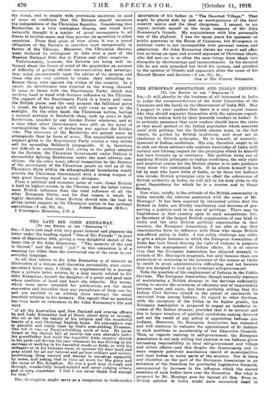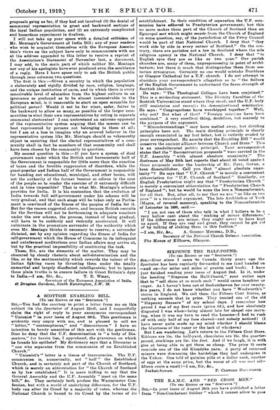THE EUROPEAN ASSOCIATION AND INDIAN REFORM. (To THE EDITOR OF
THE " SPECTATOR.")
Sm,—It will., shortly be the business of all interested in India to judge the recommendations of the Joint Committee of the Commons and the Lords on the Government of India Bill. May I suggest to your readers that there is a very cogent reason why they should acquaint themselves with the opinions regard- ing Indian reform held by their kinsfolk resident in India? It is certainly necessary that your readers should learn the views of that small portion of the Indian population which concerns itself with politics; but the British elector must, in the last resort, be guided by British traditions, and must act in obedience to British principles. He is himself, of necessity, ignorant of Indian conditions. His aim, therefore, ought to be to seek out those advieers who combine knowledge of India with natural and lifelong respect for the principles which he himself has been brought up to reverence. The problem being one of applying British principles to Indian conditions, the only right and practical course for the British elector is to take guidance from those who understand both. If he allows himself to be led by men who know little of India, or by those few Indians who invoke British principles only to effect the subversion of British authority in India, he will fail in his duty alike to the great Dependency for which he is a trustee and to Great Britain.
Now what, briefly, is the attitude of the British community in
India towards the reforms associated with the name of Mr. Montagu? It has been asserted by interested critics that the British in India are blindly reactionary and desirous of pre- serving a position said to be one of privilege. There may be Englishmen in that country open to such accusation; but, as Secretary of the largest British organization of any kind in India and the only British political organization in that country, the European Association, I am able to say that reactionaries have no influence with those who shape British non-official policy in India. I can safely challenge any critic to give a single instance in which the European Association of India has been found denying the right of Indians to progress towards the management of Indian affairs. It is of course true that the European Association has objected strongly to certain of Mr. Montagu's proposals, but only because these are premature or menacing to the interests of the masses or likely to result in great administrative difficulties, and not because they are designed to lead up to eventual self-government.
Take the question of the employment of Indians in the Public
Services. The European Association, though naturally desirous of maintaining a British element in the Services sufficiently strong to ensure the minimum of efficiency and of impartiality between caste and caste, has been perfectly willing that the Indian Civil Service should to the extent of one-fourth be recruited from among Indians. In regard to other Services, with the exception of the Police in its higher grades, the European Association is prepared to acqept an indefinite in- crease of the Indian element, provided that it be natural and due to larger numbers of qualified candidates coming forward and not the result of any policy of appointing Indians qua Indians. Moreover, the European Association has welcomed and will continue to welcome the appointment of fit Indians to such positions as membership of the Executive Councils. Then, as regards training in self-government, the European Association is not only willing but anxious to see Indians given increasing responsibility in local self-government and village and urban affairs—and this despite the discouraging and in some respects positively scandalous record of municipalities and local bodies in many parts of the country. Nor is there any objection on the part of the European Association to an extension of the franchise for provincial Legislative Councils, accompanied by increase in the influence which the elected members of such bodies have over the Executive. But what is proposed by Mr. Montagu goes far beyond all thin. Even so, British opinion in India might have reconciled itself to
proposals going as far, if they had not involved (1) the denial of communal representation to great and backward sections of the loyal Indian population, and (2) an extremely complicated and hazardous experiment in dualism.
I will not take up your space with a detailed criticism of Mr. Montagu's Government of India Bill; any of your readers who wish to acquaint themselves with the European Associa- tion's views on the subject have only to communicate with me at the address appended to this letter to receive a reprint of the Association's Statement of November last, a document, I may add, to the main part of which neither Mr. Montagu nor any of his apologists have ever produced even the semblance of a reply. Here I have space only to ask the British public through your columns two questions.
The first is this :—Given a country in which the population is elaborately and rigidly divided by race, religion, language. and the unique institution of caste, and in which there is every conceivable level of education from the highest culture to an ignorance so profound as to be almost inconceivable to the European naiad, is it reasonable to start an open scramble for political power? Would it not be far wiser, safer, fairer to the backward to allow as many, as possible of the larger com- munities to elect their own representatives by voting in separate communal electorates? I can understand an extreme opponent of the representative system arguing that the masses can be best represented by persons not belonging to them at all; but I am at a loss to imagine why an avowed believer in the representative system like Mr. Montagu should so vehemently object to ensuring that the elected representatives of a com- munity shall in fact be members of that community and shall have been chosen by the community in question.
My second question is this :—If you have a system of dual government under which the British and bureaucratic half of the Government is responsible for little more than the exaction of taxes and the forcible suppression of disorders, while the quasi-popular and Indian half of the Government is responsible for handing out educational, municipal, and other boons, will not the authority of the former become so odious in the eyes of the people as to render the exercise of it extremely difficult and in time impossible? That is what Mr. Montagu's scheme provides for India. It is his contention that the evolution of India towards full self-government under his scheme will be very gradual, and that each stage will be taken only as Parlia- ment is convinced of the fitness of the peoples of India for it. But for the reason suggested above, and because British recruits for the Services will not be forthcoming in adequate numbers under the new scheme, the process, instead of being gradual, will have to be suddenly and violently accelerated. It will culminate in the premature surrender of the authority which even Mr. Montagu thinks it necessary to reserve; a surrender dictated, net by any opinion regarding the fitness of India for self-government which the House of Commons in its infrequent and uninformed meditations over Indian affairs may arrive at, but by the practical impossibility of continuing the task.
These, Sir, are the elements of the matter. They may be obscured by cloudy rhetoric about self-determination and the like, or by the sentimentality which rewards the valour of the Indian fighting races by thrusting them under the totally =martial and largely disaffected intelligentsia; but to ignore these plain truths is to ensure failure in Great Britain's duty
to India.—I am, Sir, hc., T. E. WELRY, Secretary of the European Association of India. 42 Drarton Gardens, South Kensington, S.W. 10.



































 Previous page
Previous page